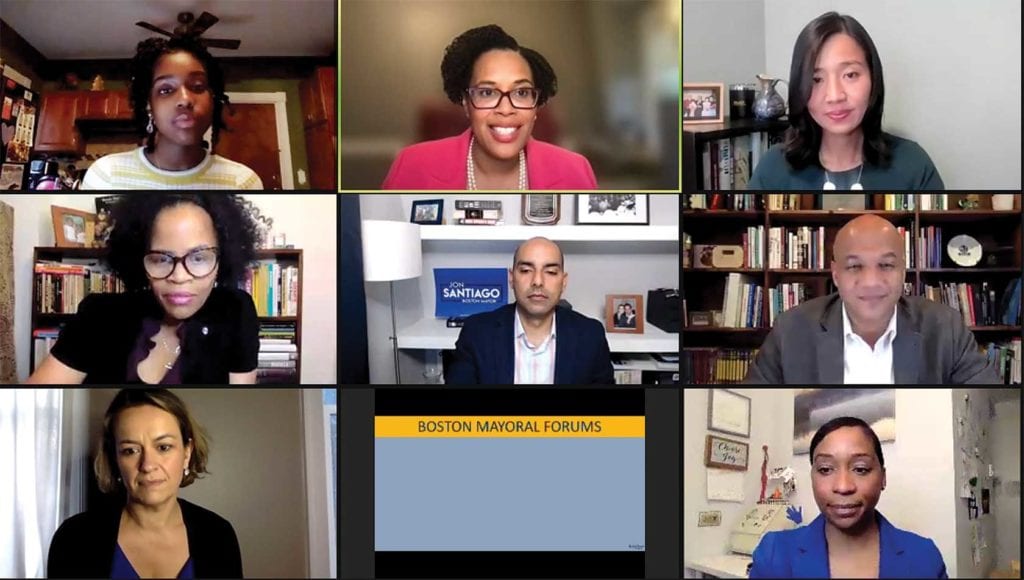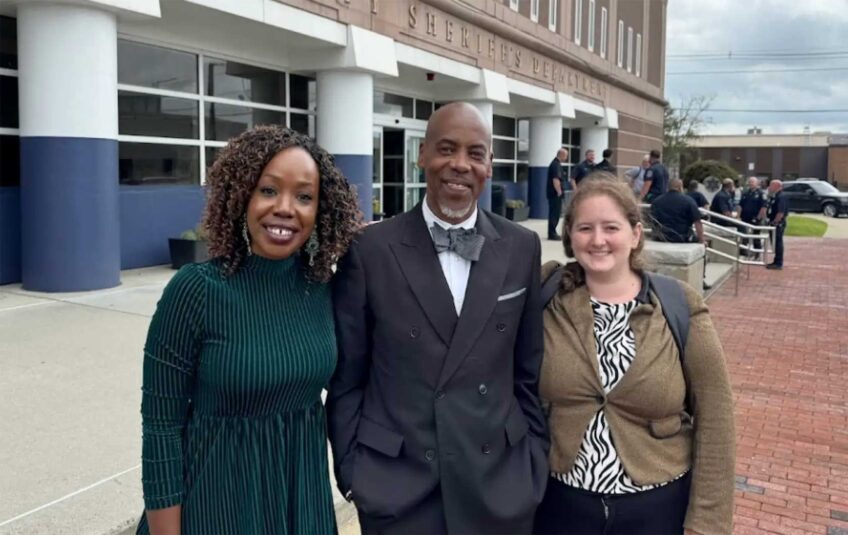
Boston’s six mayoral candidates, speaking last Thursday at a racial justice forum sponsored by the NAACP, offered competing ideas for closing the city’s racial wealth gap and compelling developers to comply with requirements for hiring local and diverse residents for construction jobs.
The virtual event was the first time all of the candidates — including acting Mayor Kim Janey — appeared on screen together.
“In terms of the wealth gap, we have to be honest about how we got here,” Janey said. “Discriminatory policies that prohibited folks that look like me and you from buying homes. … We need homeownership, we need to support our businesses.”
Janey said that she will soon announce a new chief of labor and workforce development to help achieve that goal.
Regarding developer compliance with the Boston Residents Jobs Policy, Janey said the city must ensure there’s “more teeth” and sanctions to hold people accountable.
“I, as mayor, have already invested in our budget … building the capacity to do just that,” she added.
The Boston Residents Jobs Policy mandates that the majority of work hours on large private developments and all public developments go to Boston residents, 40 percent of the work hours on such projects go to people of color and 12 percent to women.
The city has struggled with achieving developer compliance since the policy was instated in the early 1980s. The latest revision in work hours came in 2017 during the Walsh administration.
John Barros, Walsh’s former economic development chief, said a new public data dashboard would help identify developers and contractors who consistently fail to hit the job policy’s target percentages.
“Then,” Barros said, “we need to create a database of bad actors and make sure that they can no longer bid on city contracts until they in fact can show that they are going to adhere to city policies.”
The Boston Employment Commission, which monitors and makes enforcement recommendations regarding the jobs policy, has endorsed the public dashboard idea.
To address the wealth gap, Barros said he supports more homeownership and touted his idea for a guaranteed income program pilot for the city, starting with households with children. He also proposed pushing the state to increase the earned income tax credit from its current 30 percent of the federal EITC to 50 percent to help low-income families.
At-Large City Councilor Annissa Essaibi George said she supports enforcement and funding to help achieve job policy compliance, and also proposed partnerships with local unions and workforce development organizations “to make sure that they are supporting and training the workforce.”
In order to address the wage gap and ensure that all workers have access to work sites, Essaibi George said she would create a department for economic justice and workers’ rights.
State Rep. Jon Santiago said he would increase access to capital to solve the wealth gap and boost technical assistance to the minority- and women-owned businesses looking to place bids on city contracts.
“I’m going to provide ownership opportunities in the city of Boston, so Black and brown folks can own more homes, start more businesses and participate in our economy,” said Santiago.
“It’s about time we fix the city contracting and procurement process, which is not getting the job done,” he said, referring to Boston’s poor record of spending its dollars with diverse businesses. “I’m committed to increasing technical support to those businesses on building contracts.”
At-Large City Councilor Michelle Wu also vowed to increase affordable homeownership to grow wealth and close the gap.
Wu proposed a new chief of worker empowerment to help track funding and compliance to bring projects in line.
Wu also pointed to her 2017 partnership with then-Councilor Ayanna Pressley to pass an ordinance mandating a supplier diversity program to boost the city’s outreach to women- and minority-owned businesses.
“On the contracting side, I’m proud to have led the way … to write the ordinance that started requiring accountability for us to measure, manage and ensure that we would be having equity in city contracting,” she said.
Dorchester-Mattapan area City Councilor Andrea Campbell said the city government should be “pushing the private sector, the hospitals, the higher ed institutions” to diversify their businesses.
Campbell also vowed to increase homeownership and small business investments as paths for the city to bolster wealth creation.
To bring jobs policy compliance, Campbell said she supports enforcement measures like fines and other sanctions.
“We have not pulled the necessary levers to hold folks accountable to that policy,” she said.
All of the candidates vowed to center youth voices in their policy making.
Essaibi George, who has indicated support for maintaining a wholly appointed Boston School Committee, said she supports giving the student committee member both a vote and a stipend.
The NAACP will partner with other advocacy groups and host more issues-related forum events each Thursday through June 10.
Saraya Wintersmith covers City Hall for GBH News 89.7.






